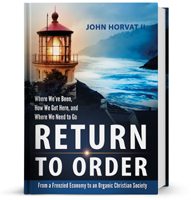
Copyright & Credit: Wellcome Library, London. Wellcome Images (CC BY 4.0)
Many North Americans, Latin Americans, and Europeans are justifiably skeptical of the global environmental movement. It shows many of the characteristics, not of a serious scientific movement, but of a political ideology or even a quasi-religious sect. The overwhelming majority of its leaders and foot soldiers espouse a not-so-hidden socialist ideology that seeks to dismantle our economic system. Meteorologists fail to accurately predict the weather two weeks into the future, yet somehow we are asked to sacrifice our entire way of life thanks to the prediction of a tenuous climate computer model two decades into the future.
The science is “settled,” we are told. We must accept global warming as an article of faith. Debate is not only wrong, but dangerous. Opponents to the movement, no matter how scientifically rigorous their arguments may be, are labelled “deniers” (reminiscent of “Holocaust deniers”).
A few years ago, The New York Times published a cartoon depicting the stabbing of global warming skeptics.1 Robert Kennedy Jr. declared that skeptics should be sent to trial at the International Criminal Court of Justice in The Hague.2 Sheldon Whitehouse, Democratic Senator from Rhode Island, supports using RICO laws to prosecute climate skeptics.3 Thousands of scientists have suffered persecution, loss of funding, or even the loss of their jobs for daring to expose holes in the man-made global warming theory.
Thousands of scientists have suffered persecution, loss of funding, or even the loss of their jobs for daring to expose holes in the man-made global warming theory.
FREE READ: Indian Tribalism: The Communist-Missionary Ideal for Brazil in the Twenty-First Century
Many of the same Christians who abhor the environmental movement also have a genuine concern for fulfilling mankind’s obligation, given to him by God in the Book of Genesis, to be proper stewards of the Earth. Is it possible to care for the Earth without being contaminated by the socialist principles of the environmental movement? What would such a stewardship look like?
1. It Would Declare God, Not the Earth, As the Supreme Being
Most of the environmental movement’s members explicitly or implicitly embrace a pantheistic worldview. For them the Earth and all living things contain a “spark” of the divinity and therefore have no final purpose outside of themselves. This naturally leads to a radical egalitarianism between man, animals, plants, and inanimate matter. If all things are equally god, no being has any greater dignity or importance or rights than any other. In his 1992 book Earth in the Balance, Al Gore praised these pre-Christian pantheistic concepts of the Earth.4 Consider this statement by Mikhail Gorbachev, founder of the Green Cross International and a leading environmental activist:
“I believe in the cosmos. All of us are linked to the cosmos. Look at the sun. If there is no sun, then we cannot exist. So nature is my god. To me, nature is sacred. Trees are my temples and forests are my cathedrals.”5
True Christian stewardship of the Earth must recognize God as the Supreme Being, distinct from His Creation. He reigns sovereign over the universe and His creatures attain their final end in Him, not in themselves. Every animal, plant, mineral, and human being reflects a unique and beautiful quality of an infinite God. It is through this beauty and order that mankind can better know, love and serve Him.
2. It Would Recognize Mankind As the King, Not the Predator, of Creation
The natural consequence of this pantheistic, neo-pagan worldview is a violent disdain for mankind. Environmentalists see man as a suicidal predator of the Earth, a being whose civilization and technology does nothing but harm himself, the Earth, and all the creatures on it. This view is expressed well by the Club of Rome, a European pro-environmentalist think tank:
“In searching for a common enemy against whom we can unite, we came up with the idea that pollution, the threat of global warming, water shortages, famine and the like, would fit the bill. In their totality and their interactions these phenomena do constitute a common threat which must be confronted by everyone together. But in designating these dangers as the enemy, we fall into the trap, which we have already warned readers about, namely mistaking symptoms for causes. All these dangers are caused by human intervention in natural processes, and it is only through changed attitudes and behavior that they can be overcome. The real enemy then is humanity itself.”6
Christian stewardship recognizes that God created the physical universe in a hierarchical way. God gave mankind an order to “Increase and multiply, and fill the earth, and subdue it, and rule over the fishes of the sea, and the fowls of the air, and all living creatures that move upon the earth.” (Gen 1:28). Man is not equal to the animals and plants. Rather, he has a truly privileged status in the physical creation. Animals and plants exist to serve man’s needs, not the other way around.
3. It Would Recognize Man As a Partner of God in the Building of Christian Civilization
The environmentalist movement tries its best to stifle human use of natural resources as best it can, whether it be opposing the construction of a dam in California, closing a coal mine in West Virginia, fighting agricultural development in Brazil, or protesting the death of Cecil the Lion. Christian stewardship recognizes that resources were put in the Earth by God for man’s use. He has every right to use them for his physical necessities.
In an organic Christian society, the Earth’s resources do not provide merely for individual men’s bodily needs. Rather they are the raw materials that man, if he corresponds to God’s grace, can and should use to construct a marvelous Christian civilization. The great works produced by Christian Europe in the Middle Ages—its towering Gothic cathedrals, mighty castles, stained glass, and sculpture just to name a few—were built using the Earth’s resources to give glory to God in everything.
Dante Alighieri called the works of man “the grandchildren of God.” When man utilizes the raw stone, sand, wood, and metal of the Earth to construct these works, they give God far greater glory than merely sitting unused for the sake of environmental “sustainability.” Who could argue that the sand, stone, and metal used to make the breathtaking stained glass of the Sainte-Chapelle in Paris would have been better left in the ground, or that the trees felled to build Christopher Columbus’ fleet be left untouched to die and rot in the forest?
Order Here: Return to Order: From A Frenzied Economy to An Organic Christian Society
A big difference between our industrialized society and an organic Christian society is the absence of what John Horvat, in Return to Order, calls the “sublime.” He defines the sublime as “those things that are of such excellence that they provoke great emotion, causing men to be overawed by their magnificence or grandeur. The sublime might be found in extraordinary panoramas, works of art, ideas, virtuous acts, or the heroic feats of great men.” When men cooperate with God’s grace and utilize the Earth’s resources to produce sublime works, they not only give glory to God but also give greater meaning to our lives and satisfy some of the deepest longings of the soul.
4. It Would See an Intelligent Mankind As the Key, Not the Obstacle, to Environmental Stewardship
Environmentalists generally see resources as finite, resource scarcity an insurmountable problem, and pollution an inevitable consequence of development. The only way to escape these problems is not to solve them, but avoid them by clamping down on development, reducing the human population, and reducing individual consumption.
They ignore the role of man’s intelligence in solving these environmental problems. Thomas Malthus, the founding father of population control, wrote in his 1798 work An Essay on the Principle of Population that population should be kept in check, since its growth would inevitably outstrip food production. Paul Ehrlich his 1968 book The Population Bomb predicted that the population explosion would lead to mass starvation by 1980. Both these philosophers were proven spectacularly wrong by the massive increases in agricultural production made possible by human ingenuity.
Many people are unaware that air, rivers, and soil of the United States are the cleanest they have been in over a hundred years, and are getting cleaner every year. This has largely been the result of engineering solutions that replaced dirty industrial processes with clean ones and governmental regulations that, until recently, respected economic growth while cleaning up the environment.
5. It Would Respect Private Property Rights
Christian stewardship must respect the Natural Law, the law that God has written on the hearts of all men. First among these laws, at least as they deal with land use and environmentalism, is the right of private property.
The environmental movement, with its ideological roots in socialism, generally works to weaken or destroy the right of individuals to own private property or dispose of it as they see fit. This can be seen in the draconian animal rights regulations that block California farmers from farming their own property upon discovery of some obscure field mouse, or in the water regulations that prevent Colorado ranchers from grazing their cattle near rivers on their ranches, or in the delay or cancellation of infrastructure projects such as the Keystone XL pipeline. Factory owners must spend great sums of money to satisfy environmental regulations, and homeowners in many areas are banned from clearing trees, building structures, or substantially modifying their own land for the sake of “environmental protection.”
Only in a society that protects property rights is the environment truly protected. Socialist or communist regimes where private property was banned or severely curtailed, such as the former Soviet Union, China, and Cuba, are today basket cases of environmental degradation. It is simple common sense that unless man has a personal stake in a property through ownership, it will be abused and neglected. In an organic Christian society, the state would work in tandem with landowners to solve environmental problems without encroaching on property rights.
6. It Would Eschew Socialist, Supra-national, Centrally Planned, Global “Solutions”
Problems of air and water pollution, land use, and resource scarcity are almost always regional or local problems which can only be properly addressed by the local government and citizenry. An attempt to impose a one-size-fits-all “solution” on an entire nation, much less the whole world, cannot possibly address each and every local problem and unique need. National or international “solutions” tend to transfer control over resources from the local population to faceless bureaucrats in a far-off capital who have likely never set foot on the very soil they are regulating.
Moreover, the purported crisis that such international agreements are supposed to solve—man-made climate change—is itself a dubious scientific theory. And behind the green curtain lies a not so hidden political ideology. Canadian writer and environmental activist Naomi Klein explains in her 2014 book This Changes Everything: Capitalism vs. the Climate:
“[A]s we remake our economies to stay within our global carbon budget, we need to see less consumption…less trade…and less private investment….Implicit in all of this is a great deal more redistribution, so that more of us can live comfortably within the planet’s capacity…Which is precisely why, when climate change deniers claim that global warming is a plot to redistribute wealth, it’s not (only) because they are paranoid. It’s also because they are paying attention.”7
Conscientious Catholics must do everything to oppose the false solutions of the Paris summit. In addition, the false dichotomy implicit within the great environmental debate—green socialism vs. environmental unconcern—must be rejected. It is only in a truly organic Christian society as described in Return to Order where the material creation is protected, used, and directed toward its proper end.
More articles like this may be found on Pan-Amazon Synod Watch, at https://panamazonsynodwatch.com/.
Footnotes
- http://wattsupwiththat.com/2014/02/23/nyt-suggests-deniers-should-be-stabbed-through-the-heart-like-vampires/.
- http://www.climatedepot.com/2014/09/21/robert-f-kennedy-jr-wants-to-jail-his-political-opponents-accuses-koch-brothers-of-treason-they-ought-to-be-serving-time-for-it/.
- http://www.weeklystandard.com/article/sen-whitehouse-d-ri-suggests-using-rico-laws-global-warming-skeptics/963007.
- Henry James, The Ambassadors (Rockville: Serenity, 2009), 34-40.
- “Nature Is My God” – interview with Fred Matser in Resurgence, No. 184 (September-October 1997).
- Alexander King & Bertrand Schneider. The First Global Revolution (The Club of Rome), 1993. p. 115.
- Naomi Klein, This Changes Everything: Capitalism vs. The Climate (Simon & Schuster) 2014, p. 92-93.

